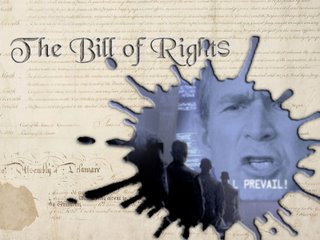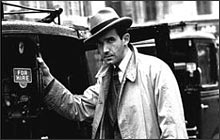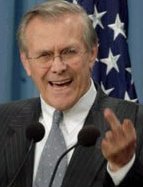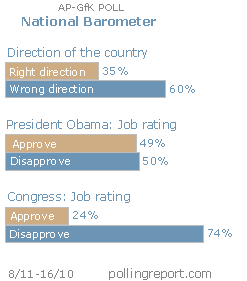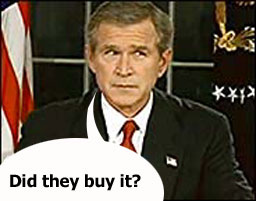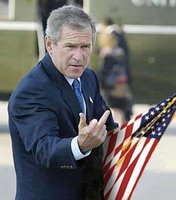 Is it too late to impeach him?
Is it too late to impeach him?The issue is pressing. If Bush is not successfully challenged, the consquences are unthinkable. Consider the following remark by Senator Russ Feingold:
If that's the law, then "...the President could even order the assassination of American citizens."In 49 B.C. Rome found itself at war with itself. Though it was prohibited by the Roman constitution, Caesar crossed the Rubicon and defied the civil authorities. The law was on the side of the Senate and the citizens of Rome but Caesar had the force of arms. Who could oppose him? Though he had violated the constitution, he marched his legions into Rome where he was elected consul and dictator for life. Cicero lamented, “Our beloved republic is gone forever.” He was right.
Over the last two days, it's become apparent that Bush lied to the nation about the extent of his widespread program of domestic surveillance. The revelations have renewed the debate: should Bush be impeached? I wonder if it is too late to impeach Bush. Has he already consolidated dictatorial powers? Has he crossed the Rubicon? Is it possible to know until he is impeached, convicted and refuses to leave the White House?
When Democratic Senator Russ Feingold introduced a resolution to censure Bush, the GOP outcry was hollow and disingenuous. Feingold, however, made a succinct case for impeachment on ABC This Week:
FEINGOLD: Not at all. You know, we’ve had a chance here for three months to look at whether there’s any legal basis for this, and they’re using shifting legal justifications. First they try to argue that somehow, under the Foreign Intelligence Surveillance Act, they can do this. It’s pretty clear that they can’t. Then there’s the argument that somehow the military authorization for Afghanistan allowed this. This has basically been laughed out of the room in the Congress. So the last resort is to somehow say that the President has inherent authority to ignore the law of the United States of America, and that has the consequence that the President could even order the assassination of American citizens if that’s the law. So there is no sort of independent inherent authority that allows the president to override the laws passed by the Congress of the United States.Let's assume the Senate found Bush guilty following an impeachment and trial. What would the Senate do if Bush simply refused to leave? The Congress cannot send in the troops; Rumsfeld takes his orders from Bush. When it comes to the military, the Congress has only budgetary control. President Abraham Lincoln issued a warrant for the arrest of Chief Justice Roger B. Taney but I know of no incident in which the Senate has issued a warrant for the arrest of the President of the United States. Lincoln's biographer's have notoriously omitted the incident involving Taney but you can find an authoritative account at: Lincoln Crossing the Rubicon.
If the Senate sent Federal Marshalls to the White House, would Bush's secret service officers bar them from entering? Dick Cheney, as I recall, has already turned away process servers and threatened them with arrest if they persisted.
We are rapidly running out of options short of revolution or armed insurrection. Some may have seen my article on OpEd News in which I advocated Ted Rall's idea of a "national recall". But that requires a Constitutional amendment. We don't have that kind of time.
I wrote another article supporting the invocation of Article 5 of the Constitution which provides for the creation of a new National Convention upon a petition by a specified number of state houses. As the late Sen. Sam Irvin said, a new national convention could literally rewrite the constitution, and, in this case, undo the harm done to it by Bush. But again —should such a convention literally write Bush and his cabal out of a job, who would enforce it? Rumsfeld will simply ring the White House with tanks. Washington will look like Tiananmen Square.A new "government" citing such a new charter would be rounded up —possibly shot even though their every action would be in accordance with the provisions of Article 5 of the current Constitution.
We are approaching a dramatic showdown not unlike the Supreme Court order that Nixon release the tapes of his White House conversations. The nation held its breath. Would Nixon refuse? Who would enforce an order of the Supreme Court?
It is my belief that we might yet save the republic. But, if Bush has already crossed the Rubicon, we might not know it until he refuses to leave the White House. If that is the case, it will already be too late to impeach —and sadly, we won't know that until the impeachment resolution is passed. The alternative to success, however, is too terrible to contemplate. As Billie Holiday said "God bless the Child that's got his own".
As Ed Murrow would say: "Good night —and good luck"! We're gonna need all we can get.
- Impeachment is not enough
- Support a National Recall of George W. Bush
- The Founding Fathers' Revenge: How the People Can Fire George W. Bush
Here's a breaking update:Hayden CIA bid hinges on spying role: senators
By Peter SzekelyWASHINGTON (Reuters) - U.S. Air Force Gen. Michael Hayden's chances of winning Senate confirmation to head the CIA depend on how he explains his involvement in eavesdropping and data collection programs, two key senators said on Sunday.President George W. Bush's nominee for CIA director can expect tough questions this week about his role in the administration's controversial domestic spying program while he was head of the National Security Agency.
"There's no question that his confirmation is going to depend upon the answers he gives regarding activities of NSA," said Sen. Chuck Hagel, a member of the Senate Intelligence Committee whom Hayden will face on Thursday. ...
NSA Whistleblower To Expose More Unlawful Activity: 'People Are Going To Be Shocked'
CongressDaily reports that former NSA staffer Russell Tice will testify to the Senate Armed Services Committee next week that not only do employees at the agency believe the activities they are being asked to perform are unlawful, but that what has been disclosed so far is only the tip of the iceberg. Tice will tell Congress that former NSA head Gen. Michael Hayden, Bush's nominee to be the next CIA director, oversaw more illegal activity that has yet to be disclosed:
A former intelligence officer for the National Security Agency said Thursday he plans to tell Senate staffers next week that unlawful activity occurred at the agency under the supervision of Gen. Michael Hayden beyond what has been publicly reported, while hinting that it might have involved the illegal use of space-based satellites and systems to spy on U.S. citizens.
[Tice] said he plans to tell the committee staffers the NSA conducted illegal and unconstitutional surveillance of U.S. citizens while he was there with the knowledge of Hayden. "I think the people I talk to next week are going to be shocked when I tell them what I have to tell them. It's pretty hard to believe," Tice said. "I hope that they'll clean up the abuses and have some oversight into these programs, which doesn't exist right now."
Tice said his information is different from the Terrorist Surveillance Program that Bush acknowledged in December and from news accounts this week that the NSA has been secretly collecting phone call records of millions of Americans. "It's an angle that you haven't heard about yet," he said. He would not discuss with a reporter the details of his allegations, saying doing so would compromise classified information and put him at risk of going to jail. He said he "will not confirm or deny" if his allegations involve the illegal use of space systems and satellites.
Tice has a history for blowing the whistle on serious misconduct. He was one of the sources that revealed the administration's warrantless domestic spying program to the New York Times.
'Toons by Dante Lee; use only with permission
